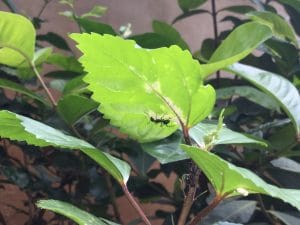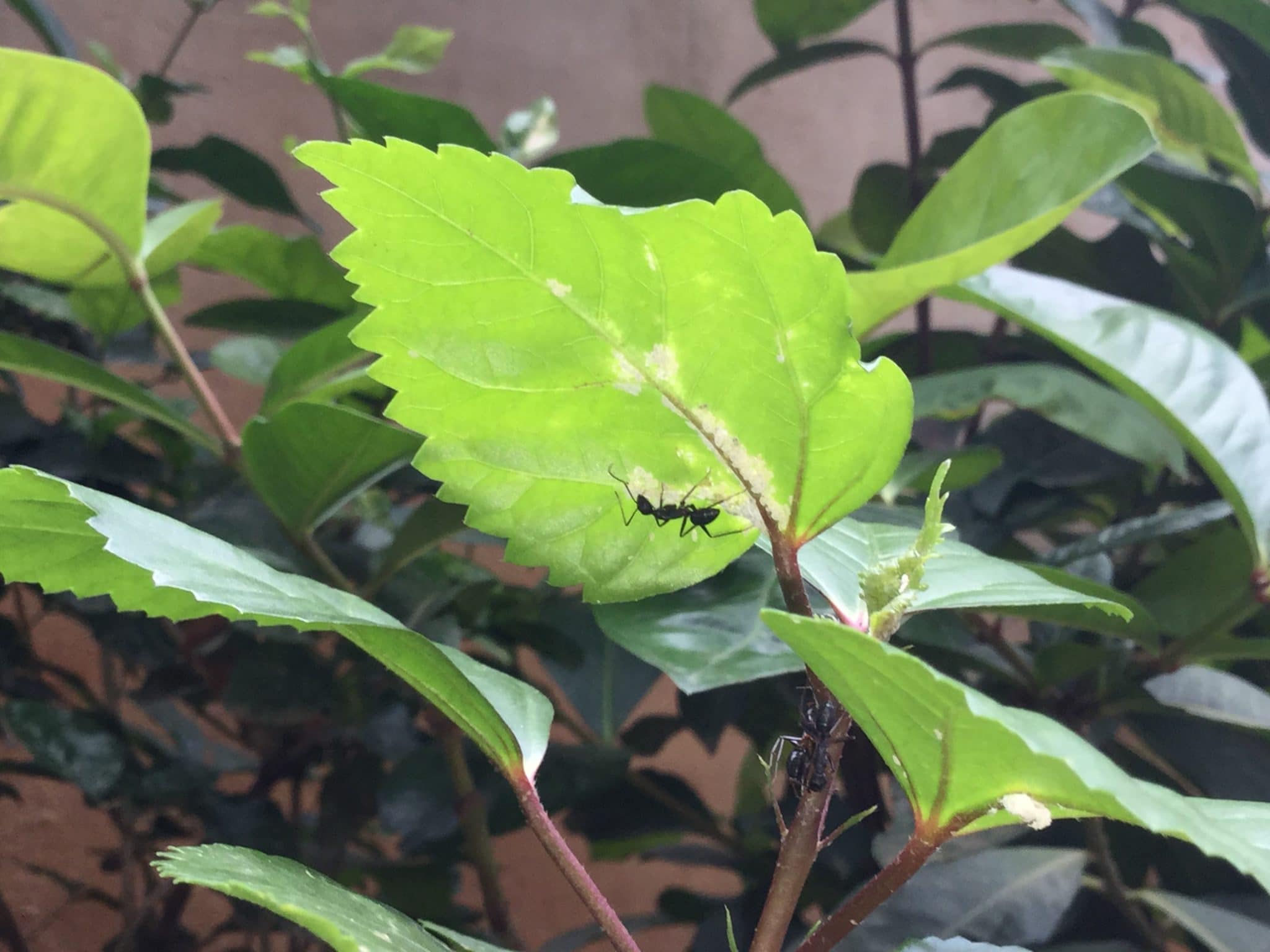Unlike other pests which bring more harm than good, ants bring both. The presence of ants in your garden ensures a balanced ecosystem. They eat insects such as fleas and termites.
They also decompose and increase organic matter and nutrients in the soil. As ants tunnel through the soil, they also improve aeration which is beneficial for your plants’ roots.
But, ants become a danger to your garden when they start eating live plants especially seedlings or weak dying plants.
Additionally, ants also ‘protect’ pests like aphids, mealybugs, and scales. It’s because ants feed on honeydew which is a sweet substance excreted by the above-mentioned pests.
Therefore, if there is an ant infestation in your garden. Chances are, there are other pests that are nibbling on your precious plants.
The good news is, you can easily get rid of ants or repel them with a variety of insecticides. This article will inform you of the different insecticides for ants in plants and much more.
What Insecticide Can You Use for Ants in Plants?
List of Pesticides for Ants
Let’s start with some of the popular pesticides for ants:
-
- EcoSmart Organic Ant Spray
- Raid Ant Spray
- Talstar Pro Insecticide
- Eco Defense Organic Pest Control
- TERRO Ant Killer Aerosol Spray
- Aspectek Safe and Practical Ant Killer Powder
These pesticides are available on Amazon and can be shipped to your location. You, therefore, don’t have to worry about carrying them with you as you travel.
Here is another list of natural pesticides or substances you can also use:
-
- Mint
- Cinnamon
- Lemon juice
- Black pepper food-grade Diatomaceous Earth
- Vinegar
- Pyrethrum
- Neem Oil
- Garlic
- Water
What pesticide to choose?
When it comes to repelling or killing ants in your garden, there are many insecticides for you to choose from. However, before you unleash your fury on these unsuspecting animals.

You need to consider if the insecticide you intend to use does pose a threat to your plants or garden. With that in mind, you can proceed to choose the best insecticide for ants in your plants.
You can either opt for natural insecticides or manufactured ones. Natural insecticides for ants that are plant-friendly include boiled water, cinnamon, nematodes, and certain essential oils that have a strong scent that repels ants.
There are chemically synthesized insecticides that are very effective. Some such as Permethrin immediately paralyze the ant’s central nervous system.
Most of these manufactured insecticides come in the form of gels, powder or aerosol sprays. It’s up to you to choose the insecticide that can help meet your gardening demands.
You can begin with the natural ones listed above and also the alternatives below and move to common industrial pesticides listed in the popular list above if the natural ones are not proving effective.
Here is a video showing how to apply the pesticide:
Are There Any Homemade pesticides or Chemicals?
Before you go all guns blazing on the ants in your garden or flower pot, you might want to try homemade pesticides or chemicals.
The advantage of using such is that they are more cost-effective and easily available. At the same time, they are very effective. Here are some homemade pesticides that can help you kill, repel and deter ants from visiting your garden.
1. Dish soap and water
Spraying the ants with dish soap and water. Ants, alongside other insects, are greatly affected by making contact with dishwater.
2. White vinegar and water
White vinegar and water. Ants dislike vinegar. Therefore, mixing it with water and spraying it unto them will kill them immediately. Though effective, vinegar is quite acidic and it can harm the soil. So ensure you don’t spray it directly to plants.
3. Lemon juice
Ants can’t withstand the strong smell of lemon juice solutions. You can prepare some and evenly spread it in your garden.
4. Citrus oil
If available, citrus oil can also get rid of ants and it is plant-friendly.
5. Borax bait
You can also make borax bait. To do this, you will have to mix ½ a teaspoon of borax with a substance such as honey that will attract the ants. You can then place these the bait in containers and put them next to your plants. One of the benefits of using borax is that it can wipe out an entire colony because the worker ants will carry the borax to their queen.
6. Diatomaceous earth
Diatomaceous earth (a natural siliceous sedimentary rock) is also an excellent homemade ant pesticide. But, it should be used as one of the final options and should be handled with care because it can affect your respiratory system. Otherwise, this pesticide is very effective at killing ants.
Other homemade pesticides
There are some other homemade pesticides you can use to kill ants in plants. They include cloves, cinnamon, chili powder, and mint tea leaves.
Here is another video explaining how to naturally remove ants from the plant’s soil:
Is Having Ants on Plants Good or Bad?
Basing on both the good and bad things ants do in the garden, it can be hard to label them as friend or foe. Let’s start with the good and weigh out as we conclude.
Having ants in your plants is beneficial in a number of ways. First and foremost, they will eat bugs that can damage your plants. Through tunneling, they will aerate the soil for your plants’ roots.
On the downsides, ants will harbor insects such as aphids and mealybugs in your garden and even go to the extent of protecting them from predators.
These sap-sacking insects can wreak havoc on your garden. The reason why ants protect them is because ants feed on the honeydew secreted by these insects. Secondly, when dealing with a huge colony of ants, their tunneling efforts can become too extensive to the point that they weaken plant root systems.
The bad outweighs the good, therefore it isn’t worth having ants in your garden. Not to mention, having anthills pop up in between your plants isn’t aesthetically pleasing especially if you are growing flowers.
If you have just spotted a few ants in your garden, you might want to start using some of the insecticides mentioned above to prevent the colony from growing in size.
Do Ants Eat Plant Roots?
When you dig up a plant and see a swarm of ants on the roots, it may seem that they are eating your plants’ roots. However, this is never the case. Most ant species are usually not interested in your plants’ roots as a source of food.
Their presence there indicates that your soil is dry and low in humus which leads to the decay of plants and organic material. And that is what ants are after.
When you notice such an occurrence, it is advisable for you to always act swiftly and apply an insecticide to the affected garden. This will ensure that the ants are killed and don’t cause more damage.
Despite them not eating your plants’ roots, ants protect mealybugs and aphids which feed on plants.
With the right insecticide, you can get rid of both ants and other pests that are lurking in your garden. Watering your garden regularly also helps get rid of ants in your plants’ roots. If the ants put up a fight, you can always use bait traps to lure them out of the roots.
How to Keep Ants Away from Plants Naturally? Does Cinnamon Work?
When listing homemade pesticides you can use for ants, we did touch on some of the natural options you can use. That is, using clover, pepper, lemon juice, and even citrus oil.
These natural options are excellent because they are chemical-free and won’t have any adverse effects on either you or the plants.
Is Cinnamon a good ant repellent?
One of the most common natural remedies of an ant infestation is cinnamon. There has been a lot of debates both on and offline regarding the effects of cinnamon on ants. But, does cinnamon work?
Cinnamon comprises of ether, alkenes, ketone, and other alcohols. These compounds are deadly to ants upon ingestion. Moreover, it does have a strong scent that ants dislike. It can also be used as an ant prevention pesticide.
If you have decided to use cinnamon as your preferred ant pesticide of choice, you will have to choose its oil or powder form. Both are great at getting rid of ants, but cinnamon oil is more effective.
The problem with cinnamon powder, especially when it is used in a garden, it can be easily dissolved in water and thus lose its strength. But cinnamon oil can be applied on the stems of plants and it can stay there for the longest time possible. You need not worry about applying it to your plants because cinnamon is very plant-friendly.
How to Drive Ants Out of Potted Plants or Flowers?
Potted plants or flowers are also not spared from an ant infestation. Even if they are indoors, ants will always find a way to get into potted plants, especially if there are other pests such as mealybugs.
Driving ants out of potted flowers or ants isn’t that different from doing so in a garden. Only that you will have to be more keen to avoid a massive infestation. An ant situation that starts from a potted flower can quickly escalate into a serious ant invasion in your home.
Here are ways you can drive ants out of potted flowers or plants:
-
- You can apply an insecticide such as permethrin which is effective at killing ants.
- Baits can also be used to trap the entire colony. Place the bait next to the pot.
- Cover the top of the soil with diatomaceous earth which kills ants within 30 minutes.
- You can directly spray the ants with a mixture of peppermint soap and water.
- If the infestation is more serious, you can create a mixture of insecticidal soap and water. Then submerge the entire pot into the mixture. This will get rid of all ants inside the pot.
- If that fails, you can always re-pot the plant. And give it a fresh start.
Final Thoughts
Have you just spotted some ants roaming in your garden? Well, thanks to this article, you know exactly what you need to do. Getting rids of ants is easy and fast, as long as you use the right insecticide.
Whether the infestation has affected your garden or potted flower, with insecticides such as permethrin you can kill the ants and watch your plants thrive.
For those who would like to use a more natural remedy, there is a wide range of natural insecticides such as cinnamon, citrus oil, and lemon. And most of these remedies can be easily prepared at home.
